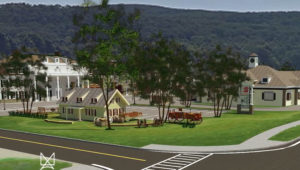A Pelham Manor developer is suing the Town of Fishkill and town officials for $5 million for allegedly blocking a retail project on land that was once occupied by the Continental Army during the Revolutionary War.
Domenico Broccoli accused the town and five past and present town board members of denying his rights to due process and equal protection under the U.S. Constitution, in a complaint filed Dec. 24 in U.S. District Court, White Plains.
The case is one of seven lawsuits filed in the past four years by or against Broccoli over control of, and even the meaning of, land that preservationists consider hallowed ground and that Broccoli proposes as a place to celebrate the town’s history.
Broccoli wants to build Continental Commons ”” shops, restaurants, an inn, museum and visitor’s center ”” at U.S. 9 and Snook Road next to an Interstate 84 interchange.

The 10-acre property is within the Fishkill Supply Depot, a vast area in and around the town where thousands of Continental Army soldiers and militia were quartered during the Revolution.
It is also within a 74-acre National Register of Historic Places site that includes Dutchess Mall and the Van Wyck Homestead Museum that served as the supply depot’s headquarters, adjacent to Broccoli’s property.
He has already built a gas station on his land, and he received town approvals to build a hotel but abandoned that project, and in 2007 he began working on the Continental Commons project.
More than a dozen archeological studies had been done on his property, the complaint states. Seven suspected grave shafts have been located in a corner of his land and one human burial has been confirmed.
The remains were not dated or identified by sex, according to the complaint, and there is no evidence that the individual was a Revolutionary solider.
Broccoli decided to preserve the burial area, according to the complaint, grant public access to the site, and place a marker to honor Revolutionary War soldiers “and those who continue to serve this great nation.”
In 2019, the town planning board ruled that the project would have no significant environmental or historical impacts, according to the complaint.
That year, Azem “Ozzy” Albra was running for the town supervisor position and campaigned on stopping Continental Commons. He won.
But before Albra would take office on Jan. 1, 2020, a public hearing was to be held on the developer’s petitions for water and sewer connections. Town Engineer John Andrews had already concluded that there was sufficient water and sewer capacity, according to the complaint.
Albra knew that the town board would likely approve the petitions, Broccoli claims, so Albra allegedly conspired with two town board members to block the hearing.
The Dec. 18, 2019 hearing was postponed for lack of a quorum, according to the complaint, and was adjourned to Dec. 30. Then Albra filed an emergency court action that day to stop the meeting, claiming procedural errors.
The court approved a temporary restraining order. On the following day, Albra withdrew his case, thus postponing action on the Continental Commons project until he took office.
Nearly nine months later, the town board denied the Continental Commons petitions for water and sewer services.
Several times in the past two years, Broccoli alleges, Albra used intermediaries to tell him that he could get the water and sewer approvals if he gave the burial area to the town.
“Albra’s repeated offers to exchange the water and sewer extensions for the burial area demonstrates,” the complaint states, “the illegal and pretextual nature of defendants’ denial of the water and sewer extensions.”
“The project in question was denied water and sewer by the Town due to the property not having necessary approvals from the Department of Health,” Albra said in response to a request for his side of the story. “As of now, the Town is not aware of the property having obtained those approvals.”
Jacqueline Bardini, Joseph Buono, Louise Danielle and Kenya Gadsden are also named as defendants.
Broccoli is represented by Manhattan attorneys Stephen J. Riccardulli and Chiara D. Kalogjera-Sackellares.





















